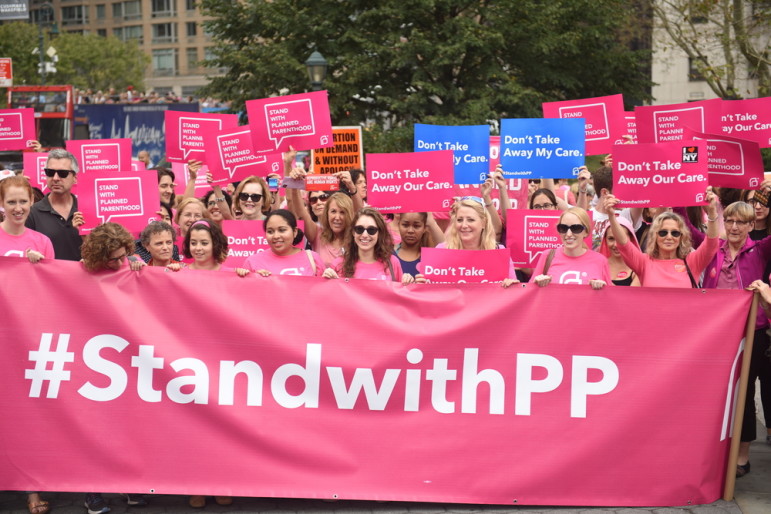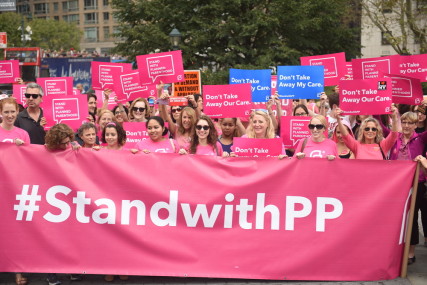There is no shortage of terms to describe the recent horror of the attack on the Planned Parenthood center in Colorado Springs, CO.
My RNS colleague Tobin Grant wonders aloud whether the Colorado Springs killings constituted an act of terrorism or a hate crime.
Call it what you will. The attack on Planned Parenthood was an attack on women’s health, on women, on medicine — in a sense, on civilized society itself.
But, were the Planned Parenthood murders religiously-motivated?
Based on what I have been reading on Facebook and Twitter, many people think precisely that.
As one writer in Salon put it: “Far-right white male radicals and extreme Christianists are every bit as capable of acts of terrorism as radical Islamists, and to pretend that such terrorists don’t exist does the public a huge disservice.”
The author then lists examples of “Christian terrorism” — including the 2012 attack on the Sikh temple in Wisconsin; the 2009 killing of Dr. George Tiller, an abortion provider; the 1984 murder of Jewish talk show host Alan Berg by white supremacists, and the 2010 attack on the IRS building in Austin.
But was religion really to blame for that list of outrages? Yes, for some of them. But hardly all. Christianity, for example, did not murder Alan Berg. White supremacy and neo-Nazism did.
Was Christianity behind Robert L. Dear’s attack on the Planned Parenthood center? So far, it doesn’t seem to be the case.
True — Colorado Springs is a “hotbed” of conservative, evangelical Christianity, but that seems like guilt by association.
So, why this sudden rush to judgement of evangelical and/or fundamentalist Christianity, and Christians — particularly white Christian men?
It’s because of the ISIS attacks on Paris. It’s a way of saying that there is nothing particularly distinctive about the radical Muslim onslaught. It’s “nyah nyah” theology — “see what white Christians are capable of doing!”
It is a good way to change the subject, to divert attention away from the most pressing religious problem in the world today — radical, jihadist Islam
As Shai Held writes in the Forward: both right and left are in parallel spasms of denial about the nature of Islam. The right would deny that religion any respectability; the left would deny it any responsibility for the hateful radicalism within its ranks.
So, can we have a nuanced conversation about faith and violence?
People of various religions commit terrible crimes — without those crimes being in the name of that particular religion. Yes, Timothy McVeigh was a white Christian. And yes, white Christians have committed far more violence acts in the United States than Muslim immigrants.
But Timothy McVeigh did not commit the Oklahoma City bombing in the name of Christianity.
That said, yes — religious people do, in fact, sometimes commit heinous acts in the name of their faiths.
As Rabbi Jonathan Sacks writes in his new book, the Abrahamic faiths (Judaism, Christianity, and Islam) all have their extreme and violent tendencies.
Why and how do those tendencies emerge?
Imagine the equalizer that you used to have on your stereo system, or that any recording studio utilizes.
You can play with the knobs, moving them up and down, changing the way that you hear the music. Like more bass? You got it. Want to strengthen the vocals? You can do that as well.
What about religions? They have their “equalizers” as well.
Over the centuries, their interpreters play with the “knobs.” Sometimes, the interpreters move the knobs in favor of the more loving, pluralistic aspects of those traditions.
Sometimes, however, the interpreters push those gentle tones into the background. The result? The more extreme voices are front and center.
So, radical settler Yigal Amir shot Prime Minister Yitzchak Rabin. Amir pushed the most extreme interpretation of texts into the front. The same is true with radical, jihadist Islam, and with Christians who act more in the name of hate than in the name of Jesus.
It is really rather simple ,
People produce religion.
People have good stuff and bad stuff within them. ‘
So does religion.
Judaism produces Yigal Amir and Abraham Joshua Heschel. Christianity produces the Spanish inquisitor Torquemada and Mother Teresa. Or, how Islam produces Sufi mystics and ISIS.
How do you battle bad religion? Religious leaders need to own up to the potential negative aspects of their teachings. They need to denounce those who fiddle around with the “knobs” on the equalizer, and push those religions into negative places.
And, they can create a new Gresham’s Law: to fight bad interpretations of a religious tradition, offer better interpretations.
Which, by the way, brings us back to Colorado Springs.
in 1960, Peter Viereck famously quipped that “Catholic-baiting is the anti-semitism of the liberals” (historian Arthur Schlesinger agreed).
The same is true about the disdain that many feel towards evangelical Christians. It is an elegant version of religious bigotry.
Let us, then, praise the evangelical churches in Colorado Springs that prayed for the victims.
For that, too, is evangelical Christianity.
The great rabbi, Abraham Isaac Kook, said: There is only antidote for gratuitous, faith-based hatred.
It is gratuitous, faith-based love.
He was right. We can start by telling the truth about faith, and what it is capable of doing — both good and bad.
To do anything less is to bear false witness.
Against religion itself.







